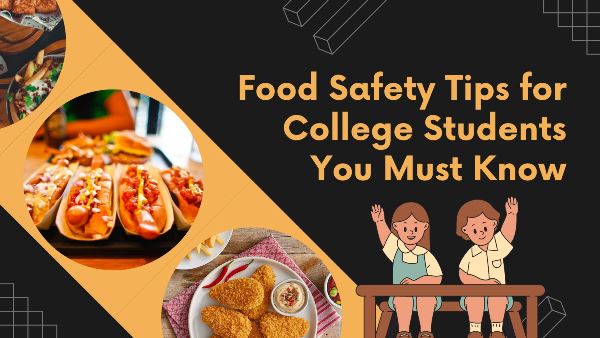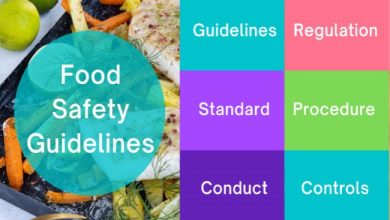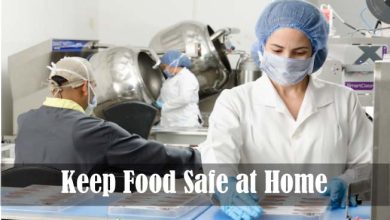6 Food Safety Tips for College Students You Must Know

College students have a hectic schedule, and they live on their own. Therefore, they eat whatever is possible without perfect planning. For example, it’s very hard for them to prepare cooked meals every time. In addition, due to the limited knowledge of food reservations, they don’t know what food safety actually is or how to maintain it properly.
Therefore, many times, it might be common for many of them to suffer from foodborne illnesses. In this guide, I will take the opportunity to deliver essential tips on how to maintain food safety. So, if you are a student like me, you will know how to prepare your food safely and how to preserve it safely.
Let’s dive into the article.
Common Mistakes by College Students
Most college students rely on readymade foods for various reasons. But they should know how to keep them safe to prevent microorganism growth. For example, letting pizza slices sit in the box overnight to eat the next morning is a common practice. Likewise, having breakfast with yesterday’s pizza is not a mistake as long as it’s reserved safely. But the common mistake is to leave them on the table and let the bacteria grow overnight.
Another typical issue is not having enough options for using a microwave to get the food warm or hot. It’s common for students living in college dormitories to experience this, as microwaves might not receive the required electricity.
What Food Should a College Student Have?
College students should aim to have a balanced diet of carbohydrates, fats, proteins, minerals, and vitamins. They should eat whole grains, meat, dairy, fruits, and vegetables. Besides, as they have to brainstorm, they should eat blueberries, fatty fish, chocolates, etc.
If you are a college student, plan a chart of healthy meals in advance. A well-prepared list can help you save time and money in college.
Basic Steps to Ensure Food Safety
Whether it’s cross-contamination or chemical contamination, both happen primarily because of bacteria. Bacteria are everywhere and make food contaminated easily, often resulting in foodborne illness. As a college student, follow the next tips to keep yourself safe.
Some basic rules you must follow to prevent foodborne illness in your dorm:
- Follow cleanliness, wash hands and surfaces
- Keep Foods Separate, Prevent Cross-Contamination
- Cook Foods to a Safe, Adequate Temperature
- Refrigerate food promptly after eating
- Don’t drink out of containers or use others’ glasses
- Don’t Share Foods
Follow cleanliness, Wash Hands and Surfaces
Wash your hands and surfaces that come into contact with food. Simple handwashing with water reduces the existence of bacteria by 23%.
Also, if you cook food yourself, maintain the highest cleanliness around your kitchen. Wash the kitchen items like cutting boards, shelves, counters, knives, and all other kitchen tools every time you use them. Use soap and water. Standard kitchen soap is enough to prevent the transmission of potentially pathogenic microorganisms. It’s accepted and recommended by the experts.
When you have to cut raw meat, use a chlorine solution to sanitize the equipment that comes into contact with it.
Keep Foods Separate, Prevent Cross-Contamination
One of the major causes of foodborne illness or breaches of food safety is food contamination, especially cross-contamination. It happens to college students due to their lack of proper storage of different kinds of food elements, including high-risk, frozen, and dried foods.
Moreover, using the same utensils for all types of food increases the risk of cross-contamination. The following steps can reduce the risk of cross-contamination:
- Freeze high-risk foods, like meat, eggs, and dairy, separately; they are highly prone to bacterial and other parasitic growth. Besides, use a separate cutting board for these high-risk foods.
- Use separate cutting boards and other equipment for frozen and dried foods that are ready to eat.
- Don’t use the same pots, plates, and other utensils for raw and cooked foods.
You must keep raw foods and frozen or ready-to-eat foods separately. For example, keeping raw meat and cooked meat is highly risky.
Cook Foods to a Safe, Adequate Temperature
While you cook food, look at the temperature carefully. Meat and other high-risk foods must be cooked to an adequate temperature; otherwise, the bacteria that stay in meat naturally will not be destroyed. And a slice of half-cooked meat will easily put your health at risk of foodborne illness.
For instance, meat like beef, veal, and lamb has to be cooked to at least 145°F, and increasing it to 160°F will be better. That minimum temperature should also be applied to seafood, fish, and eggs. If you are cooking in a gas cooker and are not experienced enough, you can use a thermometer to confirm the raw foods have got the right temperature.
Refrigerate Food Promptly After Eaten
Chill half-eaten foods, like pizza or remaining foods, quickly in the refrigerator. Keeping them outside, especially when it’s been more than two hours, will make them vulnerable to bacterial growth. Though the microwave is able to kill bacteria, foods kept for long hours outside the freezer should be avoided.
It’s worth remembering that 40°F to 140°F is the danger zone where bacteria grow fastest, and some studies found their quantities double in 20 minutes in that temperature range.
Don’t Drink Out of Containers or Use Others’ Glasses
Don’t use cups or bowls that have already been used to serve food without washing them properly. Also, avoid using random drinking glasses used by others. Water-carried germs quickly pass and spread through used glasses, containers, and plates. Instead, use only clean dishes and utensils for serving and storing food.
Don’t Share Food
Food sharing is a normal act while you live in a college dorm. However, don’t take bites directly off each other’s plates. You might unknowingly swallow harmful bacteria that spread through contact. Rather, cut and take your own portion on a plate.
FAQs
Can you eat leftover food?
Yes. However, do not eat any remaining food, like pizza slices, chops, bread, etc., that was left out overnight. Ready foods that are kept outside for over 2 hours become highly prone to bacterial growth. Put them in the microwave before you consume readymade food.
How to keep your food safe?
The basic rule of keeping or storing food is to keep hot food at a hot temperature and cold food at a cold temperature. For hot foods, keep them above 140°F, and for cold foods, keep them below 40°F.
How to cook safely in a college dorm?
If you are a college student living in a dorm, follow the essential rules I have listed in this article. Go through them in the earlier paragraphs. However, maintaining cleanliness, storing different kinds of foods separately at the right temperature, and cooking raw foods at the required heat will be adequate.
Final Thoughts
College is a place to learn; therefore, most of the student’s time is spent on their studies. As a result, they rarely have enough time, options, and mental energy to focus on food, resulting in a lack of safety and hygiene. However, they can avoid foodborne illness by following some fundamental and simple tips.
I hope you find this article helpful. If you have any questions, let me know. I will address it happily.



